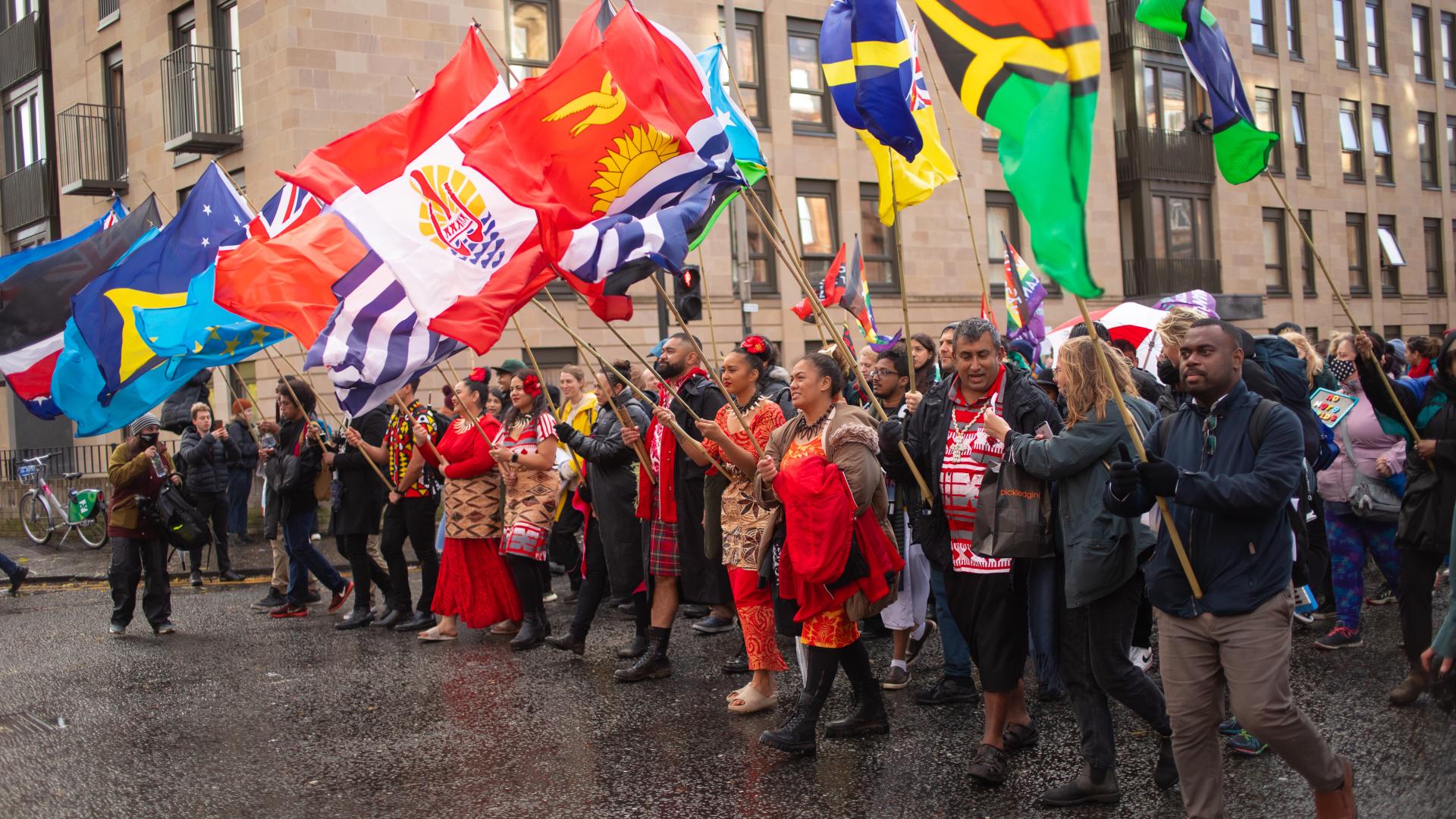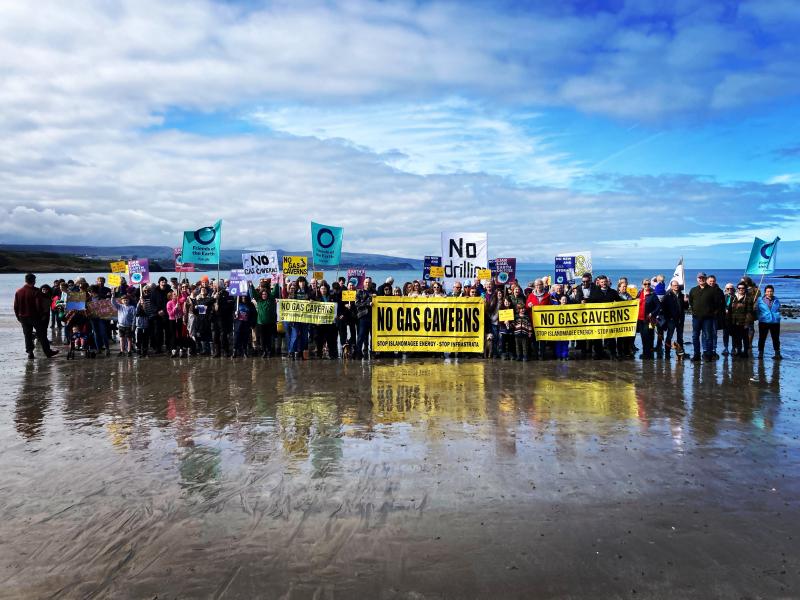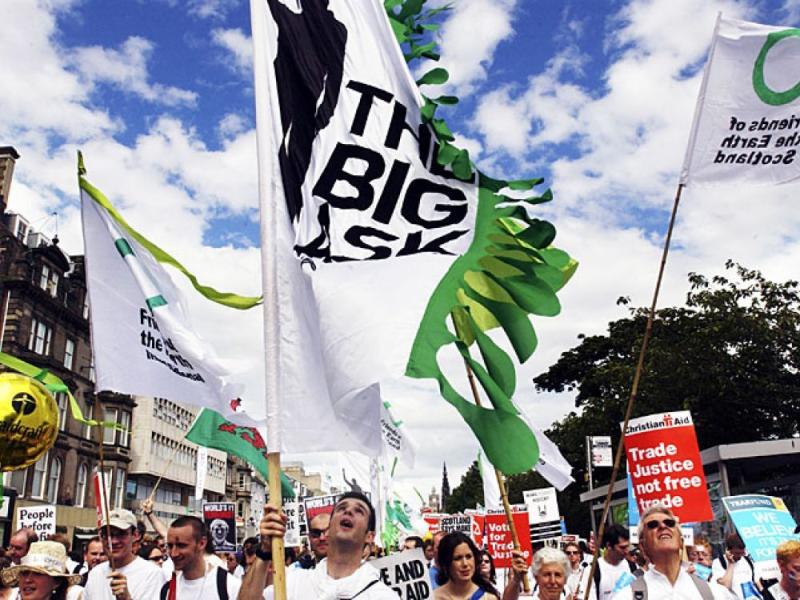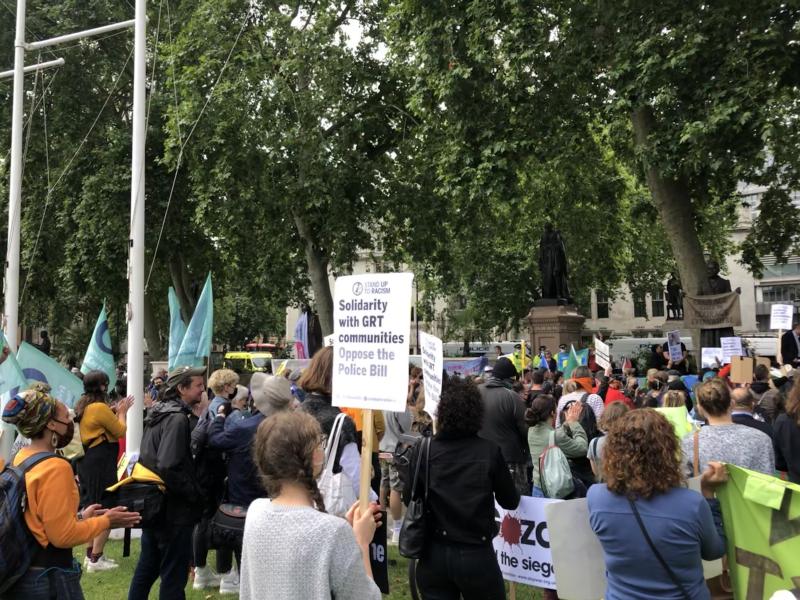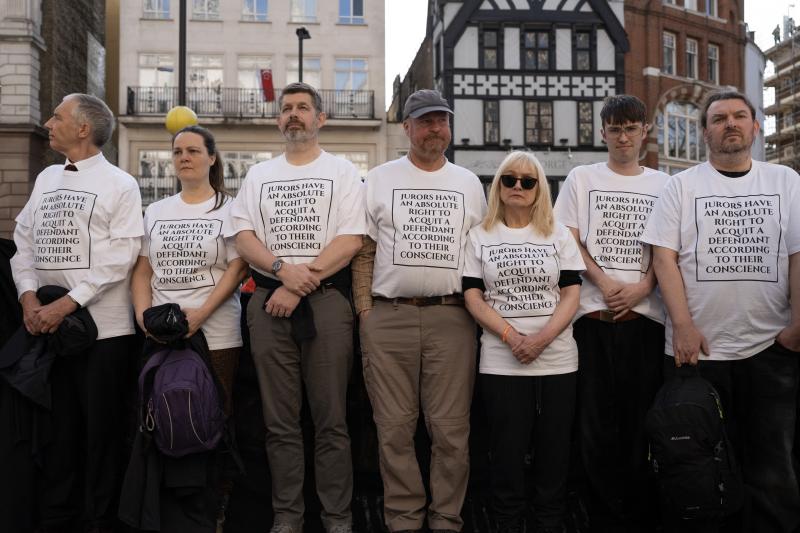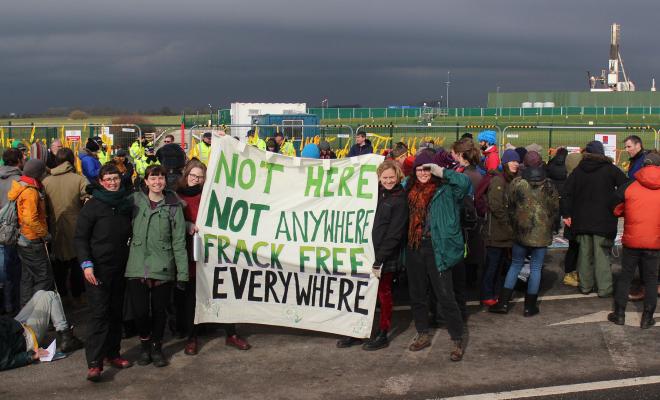Joanna Watson17 Jun 2025
For many years I was the lead in Friends of the Earth’s events team. We regularly organised actions and demos to support environmental and climate justice movements to raise awareness and amplify the voices of those demanding change. But in that time, I’ve seen the freedom to protest coming under increasing and relentless political attack, with the introduction of draconian legislation having a chilling effect on citizens’ ability to protest legally and peacefully.
Last year was the 40th anniversary of the miners’ strike, which was a pivotal moment for policing and public order in the 1980s. Since then, successive governments have continued to become more repressive and anti-democratic, with less tolerance for public expressions of dissent.
With Friends of the Earth’s legal interventions on the part of climate protesters recently in the courts, 40 years on is a good time to reflect on why the ability to protest and speak out is fundamental to the struggle for environmental and social justice. I’ll also explain why it’s so important for Friends of the Earth, as an environmental justice organisation, to take an active role in supporting freedom to protest, opposing the chilling effect of current bills and legislation, and adding our voice to reinforce solidarity and intersectionality.
Public protest is a powerful campaigning tactic
The UK has a long history of people coming together to stand up for communities, the environment and workers’ rights by demanding political change. Campaigning covers a raft of tactics, from community organising and letter writing to lobbying and demonstrating – whether outside drilling sites, polluting factories, council offices, company HQs or parliament itself. This last tactic – public protest – is a fundamental part of a healthy democracy. And I suspect we wouldn’t be seeing an ever-more repressive legal approach to climate protests, if such protests weren’t an effective challenge.
Protest on the streets is by its very nature disruptive – whether it’s the historic actions of the anti-apartheid movement or hundreds of thousands of people marching to parliament in the Stop the War demo. And protestors have been demanding action on climate change since the 1990s. Most recently, the sense of a climate emergency has been reinforced by protest, ranging from Greta Thunberg and the youth strike movement to the growing number of activists being arrested, sentenced and imprisoned. It may seem unlikely in the current political climate, but in 2019 Greta Thunberg met with then Environment Secretary Michael Gove and representatives of other parties to talk about the climate crisis – precisely because protesters had moved it up the agenda.
While it’s not a standalone tactic, mass protest is formidable as a demonstration of public will. It threatens the status quo and can be positioned by reactionary forces as “the enemy within”. The early phases of tightening state control over public demonstrations that we saw during the miners’ strike, for example, have their counterpart in what’s happening now. Peaceful protestors are being charged with offences contained in legislation designed to address terrorism and are receiving disproportionate sentences. This criminalisation of protest creates uncertainty and can deter ordinary people from their right to challenge those in power.
So, why is freedom to protest so important? Here are some past examples of the role it’s played that help us reflect on what was achieved.
The importance of protest
Shifting the narrative
Protest raises awareness of an issue, creates publicity, provokes debate and plays a part in changing the prevailing narrative.
Protests are often viewed as fringe activity. But protesters vilified by the government of the day as troublemakers and subversives – like the Suffragettes, anti-apartheid activists or Greenham Common campaigners – are remembered today as catalysts for the change we now take for granted. When people from a community unite in protest, they can be very effective in voicing local concern, that may have national significance. The successful local opposition to mining giant gas caverns under Larne Lough is a powerful illustration.
Because a small community led by the redoubtable Nanas from Blackpool didn’t like what they heard about the dangers of fracking, they held daily protests outside the Preston New Road site. Because communities all around the country created an effective network of groups united against fracking, that particular aspect of the fossil fuel industry has been prevented from taking hold in the UK. And because they linked up with anti-fracking groups in Australia and the US, campaigners and community protestors have been able to develop tactics and share insights with others resisting this harmful technology around the world.
Protest can have impact in the long term
Often, the demands of an initial protest aren’t achieved. The Iraq war went ahead, the Newbury Bypass was built and we still have a nuclear deterrent. But Tony Blair’s reputation and legacy has been forever overshadowed by the Iraq war, the huge ambitions of the 1990s Roads Programme were put on hold for decades and the siting of US nuclear missiles at UK bases ended with the signing of the INF treaty in 1987 and the end of the Cold War in the 1990s.
Publicly taking a stand
Progress on international climate negotiations has been painfully slow and constantly challenged by vested interests and powerful fossil fuel lobbyists. But thousands of people mobilising and demonstrating around the annual UN climate talks (as Friends of the Earth organised in The Hague, Bonn, Copenhagen, Paris and others) is a very public way of holding national politicians to account and ensuring the fossil fuel lobby doesn’t just get its own way. We saw how peaceful protest boosted activists’ morale and by taking a principled stand, the arguments in favour of taking action on climate breakdown can bring the silent majority alongside over time.
Not all protests or demonstrations are anti-something
People power in support of an issue or action helps create a mandate for politicians to act.
In the early 2000s, the environmental movement coalesced around demands for a Climate Change Act, which was a game changer. Different strategies, perspectives and interests were represented in a movement-wide coalition, but a range of tactics, including big demos and lobbies, together persuaded government that taking action on climate change would be popular with the public.
Indeed, voters were largely ahead of government thinking at the time and the breakthrough came when Blair’s Labour government adopted the Climate Change Bill as a government bill. Friends of the Earth’s Big Ask campaign was so successful in the UK that it was taken up and emulated in several European countries by the Friends of the Earth Europe network.
Protests are powerful tools for intersectionality
When people with different interests come together in a protest movement they highlight the crossover between issues. For example, we can adopt different approaches and different framings when we work with activists from the Global South. Environmental and social justice issues came together when Friends of the Earth headed up an international group of environmental justice campaigners under the banner “Don’t let big business rule the world”. This demanded stricter rules for corporate accountability across a range of issues at the Earth Summit in Johannesburg in 2002.
Although solutions can be interrelated, some media and politicians resist recognizing these connections and seek to isolate communities and denigrate activists, lawyers and those working to make the world better and fairer.
Collective action fuels energy and commitment
Participating in a demo creates a feeling of solidarity and connection with a wider movement. Challenging the prevailing political or social norms together can be very liberating.
A demo can also be the start of an activist’s journey. People who participate in a demo are already questioning the system and asking questions about power. Standing up and being counted is empowering. So, it may be an entry point for future political decision makers and influencers.
However, the chilling effect of repressive legislation aimed at more radical action groups impacts on less confrontational gatherings and risks making all protests much less attractive to people who want to participate in collective action.
How protest is under threat in the UK
Friends of the Earth upholds the importance of peaceful protest to democracy. It’s a right protected under international law and we must fight to ensure it’s fully upheld under domestic UK law too.
But restrictive legislation is increasingly hampering peaceful protest. It’s supposedly targeted at the more disruptive direct action groups and individuals, but the scope of the laws passed is much bigger. The international rights monitor Civicus has downgraded the UK’s status to “obstructed,” a status it shares with Hungary, which has a far-right orientated government.
Recent research has shown that British police arrest environmental protesters at nearly 3 times the global average rate, revealing the UK as a world leader in the crackdown on climate activism. This is why it’s so important for Friends of the Earth to be in the room. It’s also why we intervened in the Just Stop Oil case to challenge the unprecedented lengthy sentences of 5 climate protestors.
History repeating itself: the Newbury Bypass campaign vs today
Nearly 30 years ago, the Newbury Bypass campaign and the roads protests saw an emboldened state apparatus. Just 11 years after the miners’ strike, we quickly saw the iron fist in a velvet glove, as my own experience of organising actions, rallies and installations on the route of the Newbury Bypass bears out.
We were told by police liaison that officers were there to neutrally facilitate peaceful protest, but after the first 2 days politicians intervened and police tactics became much heavier and repressive. We were threatened with arrest for trespass when walking on a public footpath. Police horses exercised like cavalry close to demonstrators walking across a field. Activists were hauled out of trees. We were followed everywhere by Highways Agency detectives and intrusively filmed on the bypass route, at public meetings on traffic reduction and at rallies in Westminster.
Today, the pattern continues and the tactics are similar. The first few months of 2025 have shown a concerning trend against peaceful protest on Palestine and climate change.
Here are a few examples:
- The upholding of lengthy (albeit somewhat reduced) jail sentences for peaceful Just Stop Oil protesters
- Charges brought against the organisers of the national Palestine demonstration
- The police raid on a Quaker House where a Youth Demand meeting was being held on climate change and Palestine
- The arrest of the co-executive director of Greenpeace UK following a stunt to dye the water outside the US embassy red, highlighting the death and devastation caused in Gaza as a direct result of US arms sales to Israel.
A repressive approach to protest and direct action continues. Disappointingly, the Labour government hasn’t been willing to repeal harsh legislation on protest. Indeed, Home Secretary Yvette Cooper tried to overturn the High Court's decision in a challenge brought by Liberty, which found that the lower threshold for serious disruption pushed through by her predecessor Suella Braverman was done unlawfully. The law, forced through in secondary legislation, would have allowed police almost unlimited powers to shut down protest and arrest demonstrators.
Thankfully, in a landmark ruling on 2 May2025, the Court of Appeal agreed with Liberty’s legal team and upheld the High Court’s judgment. As Akiko Hart, Liberty’s director, said, “This ruling is a huge victory for democracy, and sets an important precedent that Government ministers must respect the law, and cannot simply step outside it to do whatever they want.”
Despite initially backing the tougher definition, the government has now dropped its case against Liberty, meaning the law reverts to its previous wording and protests once again need to cause "serious disruption" to warrant police enforcement. Liberty reminds people that we need to stay vigilant, as this government isn’t immune to the growing tendency to criminalise protest and cast human rights aside. Arrests, jail sentences, tagging, surveillance, deportation of peaceful environmental and social justice protestors and use of AI-enabled facial recognition technology continues.
How Friends of the Earth is fighting for our freedom to protest
In recent years we've seen a massive clamp down on peaceful protest, with a series of pieces of high-profile authoritarian legislation creating new protest offences, increasing police powers and punitive punishment. Much less well known is the huge growth in the use of wide-ranging civil injunctions taken out by both public authorities and private companies, including oil and gas companies. These have created a confusing parallel system of prohibitions on protest. We believe that these injunctions have a chilling effect on freedom of speech and the right to express dissent.
Denis Fernando, Environmental Justice campaigner, Friends of the Earth
Friends of the Earth believes in using the law to protect democratic freedoms. One of our most recent civil liberties cases is challenging anti-protest “persons unknown” injunctions. These are court orders being used by public authorities and private companies, such as fossil fuel companies, to bypass the criminal justice system and shut down community opposition. In March 2024, we filed an application on protest rights at the European Court of Human Rights, which could set important precedents if we win.
It's because we believe freedom to protest is so important that, together with Greenpeace UK, we intervened to help bring about the important legal victory which resulted in lengthy sentences reduced for Just Stop Oil activists. A key legal test over the right to protest has culminated in a critical win for 6 out of 16 climate activists in an appeal at the Court of Appeal.
It’s right that Katie de Kauwe, our Senior Lawyer, has the last word on the unprecedented sentences handed down to the Just Stop Oil protesters:
It’s staggering that peaceful protesters driven by the need to protect us all from climate breakdown can be treated more harshly under criminal law than those engaged in racist, Islamophobic and anti-migrant violence, intimidation and destruction. What does this say about our democracy? It’s an utter travesty that people engaged in entirely peaceful protest are facing harsher penalties than those taking part in racially motivated violence.
Katie de Kauwe, Senior Lawyer, Friends of the Earth


